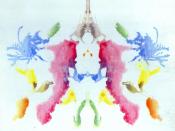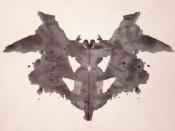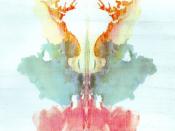The Rorschach and Bipolar Disorder
Singer, Hedy K., Brabender, Virginia. (Spring, 1993). The Use of the Rorschachto Differentiate Unipolar and Bipolar Disorders. Journal of Personality Assessment. 60, 333-345
The article begins by stating that the DSM-III-R, the most current issue at the time, divides affective disorders into 2 categories: unipolar and bipolar. Those with unipolar disorders only experience depressive episodes. Individuals with bipolar disorder experience episodes of mania, as well as depression, or only manic episodes. The distinction between the two has been evidenced in things such as different responses to medication and concurrence in twins. Psychological testing may be another way in which the disorders can be discriminated. Previous research has found the responses given between the polar groups are different on the Rorschach test. Research cited in the article found that bipolar subjects frequently give crude color responses. Their answers tend to be centered on the formal features of he card.
Unipolar subjects tend to fill their responses with emotion and personal meaning. The authors felt however that previous research is lacking and would like to compare Rorschach protocols in both stages of the illness.
The study sample consisted of 29 unipolar 33and bipolar inpatients. Patients who fit the experiment's criteria were given the Rorschach test. It was administered by one of three clinicians who were not informed of the subject's condition. The tests were scored using Exner's Comprehensive System (1986).
For the bipolar manic group, the most distinguishing aspect was a high level of thought pathology. The manic group also demonstrated impairment when reality tested. The authors speculate that they are likely to disrupt their reality testing with feelings of hostility, unlike the unipolar group. The manic group was also found to intellectualize more than the bipolar depressed group. In contrast, the bipolar depressed group...


